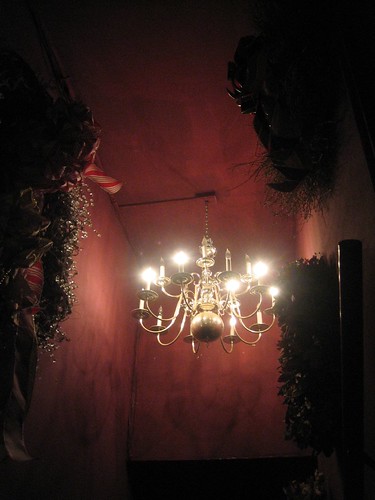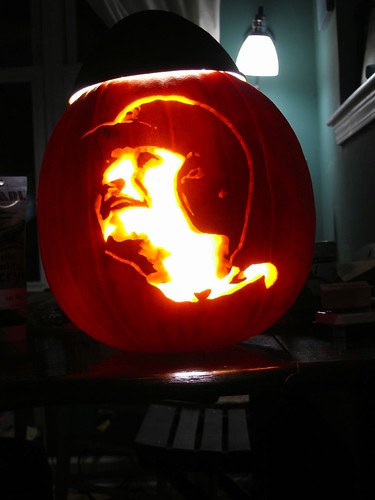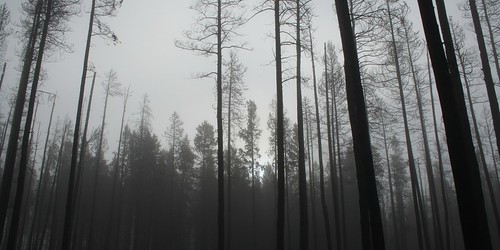
{Manny-kin by rocketlass.}
October, that is. All Hallow's Eve is here, and the haunting of this blog is coming to an end. I hope you've enjoyed it.
But there's still time to sneak in one of my favorite unexplained scary stories, that of Spring Heeled Jack, "the terror of London" in the 1830s. Though there have been whole books written about Jack--from penny dreadfuls to relatively serious scholarship--Peter Ackroyd's brief account in London: The Biography (2000) is a good place to start. He draws primarily on the testimony of a young woman who was assaulted by Spring Heeled Jack in 1837, the year he was first spotted:
One statement, given by Jane Alsop at Lambeth Street Police Office, describes how the unfortunate girl encountered him on her doorstep. "She returned into the house and brought a candle and handed it to the person, who appeared enveloped in a large cloak, and whom she at first believed to be a policeman. The instant she had done so, however, he threw off his outer garment, and, applying the lighted candle to his breast, presented a most hideous and frightful appearance, and vomited forth a quantity of blue and white flame form his mouth and his eyes resembled red balls of fire." . . . Jane Alsop's testimony had other, equally disturbing elements. From "the hasty glance which her fright enabled her to get at the person, she observed that he wore a large helmet; and his dress, which appeared to fit him very tight, seemed to her to resemble white oilskin. Without uttering a sentence he darted at her, and catching her part by the dress and the back part of her neck, placed her head under one of his arms and commenced tearing her gown with his claws, which she was certain were of some metallic substance."Fortunately, two of Jane's sisters, hearing her cries, were able to drag her away and slam the door, locking her assailant outside. But even then, as she explained in her testimony,
Notwithstanding the outrage he had committed, he knocked loudly two or three times at the door.Ackroyd rightly points out just how creepy the knocking is:
This knocking at the door, so strange that it could scarcely have been invented, is perhaps the most alarming moment in an entire alarming episode. It is as if to say--Let me in, I have not finished with you yet.
Others who spotted Spring Heeled Jack over the course of the next few years emphasized other attributes: several noted that he could leap remarkably high; others heard him cackling like an insane man; many emphasized his devilish appearance. Though the public furor over Spring Heeled Jack died down later that decade, sightings continued to be reported sporadically for the rest of the century. The Wikipedia, in fact, in a very good entry for those interested in learning more about Jack, catalogs sightings as recent as the late 1980s; it also runs through a variety of explanations, of varying degrees of likelihood, that have been offered over the years.
And now, because you can never be too careful when dealing with malign spirits, I'll close October with a brief parable by Robert Louis Stevenson that I found in The Suicide Club and Other Dark Adventures. It will surely keep the demons away for a while.

{Satan, by Gustave Dore, illustration for Paradise Lost}
The Devil and the Innkeeper
Once upon a time the devil stayed at an inn, where no one knew him, for they were people whose education had been neglected. He was bent on mischief, and for a time kept everybody by the ears. But at last the innkeeper set a watch upon the devil and took him in the fact.
The innkeeper got a rope's end.
"Now I am going to thrash you," said the innkeeper.
"You have no right to be angry with me," said the devil. "I am only the devil, and it is my nature to do wrong."
"Is that so?" asked the innkeeper.
"Fact, I assure you," said the devil.
"You really cannot help doing ill?" asked the innkeeper.
"Not in the smallest," said the devil; "it would be useless cruelty to thrash a thing like me."
"It would indeed," said the innkeeper.
And he made a noose and hanged the devil.
"There!" said the innkeeper.

















